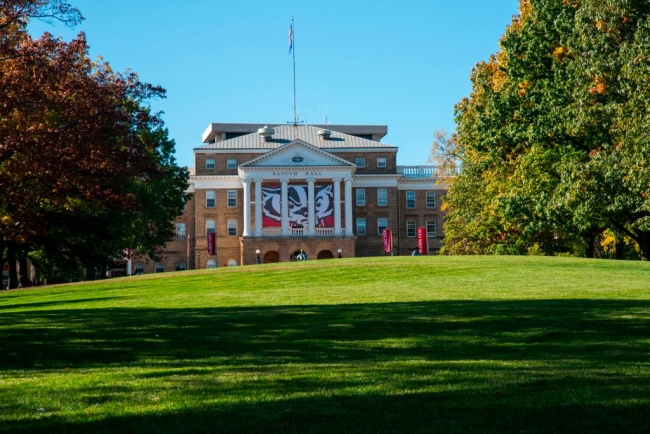You have /5 articles left.
Sign up for a free account or log in.

Bascom Hall on Bascom Hill at the University of Wisconsin at Madison.
Education Images/Contributor via Getty Images
At the end of August, nine days before students started class at the University of Wisconsin at Madison, more than two dozen local elected officials sent a letter to university administrators urging them to significantly alter their plan to bring students back to campus in the fall.
The officials asked for three changes to the university’s “Smart Restart” plan. First, they asked that it take instruction fully online, with very few exceptions. Second, they asked that it limit dormitory living to students without safe alternative housing options. Finally, they asked that the university publicly disclose a trigger point at which it would cancel all in-person instruction for the semester in the event of a COVID-19 outbreak.
The officials didn’t have much input in the university’s decision. The only thing they could do was implore the administration to reconsider their plans, said Yogesh Chawla, a supervisor for District 6 on the Dane County Board of Supervisors, the county in which Madison is located.
"They didn’t do that," he said.
Since the university began testing on Aug. 6, more than 2,000 students have tested positive for COVID-19. That’s about 7 percent of undergraduate students, a data point that blows out of the water initial outbreaks at University of North Carolina at Chapel Hill and the University of Iowa. Of those thousands of students, more than 80 percent reported having symptoms.
University chancellor Rebecca Blank has defended the decision to reopen, saying that the university wanted to bring students back because in-person instruction was more effective and that many students would wind up living in the Madison area no matter what the university did.
“Under those circumstances, we were going to see 35,000 students in town regardless of which modality we chose,” she said in an email. “It makes a lot more sense to have some interaction, then, as it provides the opportunity for more structure, more testing, and more effective communication.”
In response to the outbreak, the university implemented a campuswide shelter-in-place order for students, effective Sept. 7 through Sept. 21. In-person classes have been canceled for the duration of the mandate, and university-sponsored social events and club meetings have also been put on hold.
The university having to take such drastic action so soon after bringing students back to campus does not sit well with local officials.
“We’ve had such a short time period here and such a rapid spike in cases, and we’ve just seen the devastating effects of this,” said Chawla, the county supervisor. “A lot of the elected officials who signed that letter, we basically warned that this was going to happen, and it doesn’t look like the university has a real plan to respond to it.”
The situation has placed strain on the flagship university's relationship with important constituencies -- students, local officials and local businesses. But not everyone has had the same reaction to the recent spike in infections, and their thoughts are often complex.
‘They Live Here, They Spend Here, They Vote Here’
The university is testing students who live on campus every two weeks, but the effort fails to reach a majority of its students. More than three-quarters typically live in off-campus housing, and the university has no testing requirements for those students.
Will Mandel, a sophomore at the university studying educational policy and French, lives in an off-campus house with several other students. He’s been getting tested weekly but said the university has not required testing for students off campus.
“We’ve received emails that encourage it, especially if you have symptoms, but that’s kind of the general advice for anyone in Madison,” he said.
The mandatory shelter-in-place order is not being followed by everyone, Mandel said.
“There are obviously reports of people on frat row not respecting social distancing guidelines,” he said. “Part of me is hesitant to place the blame on individuals when I feel like this is all resulting from administrative decisions.”
Blank and other university administrators have been criticized in local media over the college’s reopening plan. The editorial board of The Daily Cardinal, one of the university’s student newspapers, called the university’s decision to reopen reckless.
“Simply put, UW’s blatant disregard for human life -- specifically, the lack of care for the immunocompromised, BIPOC students and other vulnerable populations -- is humiliating,” the board wrote.
Mandel said that he and his friends feel let down by the administration.
“The fact that nowhere along in the process of debating about how to reopen UW Madison did anyone stop and think about whether or not it was a good idea to bring thousands of freshmen back into dorms, or even have students on campus in the first place -- it feels ridiculous,” Mandel said. “It feels like they don’t care at all. That’s a sentiment that I have; it’s a sentiment that my friends have. It feels like we’ve been kicked to the side for money or whatever they’re getting out of this.”
Blank said that the university is working to curb the spread through the two-week lockdown. She did not say whether it would consider pivoting to online instruction for the rest of the semester.
“I understand that people on and off campus are worried and upset about these cases -- I am as well. As I said when we recently announced our two-week switch to online instruction, we must bring our daily case totals down and we are taking aggressive action to do that,” she said in an email. “This week and next will be critical. We will be looking at the data each day and sharing it with you through our dashboard. I very much hope that by the end of next week, we’ll see a downturn in positive cases.”
For local businesses, bringing students back is complicated. Many restaurants, bars and other businesses rely on student customers, especially those on State Street and University Avenue, where many students live and socialize, said Zach Brandon, president of the Greater Madison Chamber of Commerce. The chamber’s board, made up of 49 local businesses, was supportive of students’ return to campus.
Brandon recognized the severity of the outbreak but took issue with the idea that students could be exported from the city to mitigate the issue. He didn’t think sending students home would solve anything.
“This is home. This idea that we can tell students that they aren’t home when they’re here doesn’t match reality. They live here, they spend here, they vote here,” Brandon said.
While many have taken aim at the university's administration for the recent outbreak, Brandon didn’t point fingers at any one institution.
"It’s just as if it would be an outbreak in any part of our community," he said. "We would have adjusted for it and accounted for it, and certainly not assigned blame."
Currently, Madison businesses are in phase two of a county reopening plan. Restaurants can serve indoors at 25 percent capacity, while bars are limited to outdoor seating and takeout service. Most businesses and workplaces can operate at 50 percent capacity. Brandon, of the chamber of commerce, doesn’t believe that the current outbreak will slow the county’s reopening progress.
Chawla, the county supervisor, worries about the impact that the recent outbreak could have on businesses and schools in the area.
“The effects of this are not limited to the University of Wisconsin campus. This is going to slow down reopening for businesses downtown. This is going to slow down reopening for public schools,” he said. “Nothing that happens in a pandemic happens in a vacuum.”
Ultimately, Chawla thinks any animosity between the university and the surrounding community will be short-lived.
“There’s a really strong relationship between the university and the community. The university is the economic engine not only of the City of Madison and Dane County, but the state as a whole,” he said. “There is definitely going to be some repair that will need to be done to that relationship, but that’s a long-term problem. Our short-term issue right now is how are we going to deal with this alarming spike in COVID cases.”








